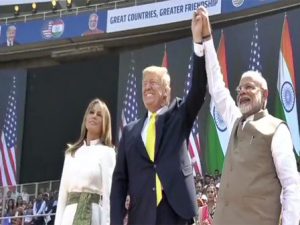Don’t Succumb to the US Pressure on IPRs; CSOs urge India
Public health policy experts and representatives of organisations like the All India Drug Action Network (AIDAN), Third World Network (India), National Working Group on Patent Laws and WTO, Campaign for Access to Medicines and Devices–India, Drug Action Forum, Karnataka (DAF-K) urge the Indian government to reject any of the US demands to influence the implementation of India’s IP legislations.

Civil Society Organisations (CSOs) have raised concerns about the proposed US–India Memorandum of Understanding (MoU) on Intellectual Property Rights (IPRs) for the exchange of knowledge and training of officials working in offices undertaking IP management in India. According to them the US has been pressing India to make changes in its IP legislations, rules and procedures through the annual United States Trade Representative (USTR) Special 301 reports. Moreover, the US wants Indian IP management officials to opt for a stronger IP regime. The US has been opposing public health safeguards in the Patents Act. According to CSOs, India has been the target of USTR since the country chose to make use of all the flexibilities available in the TRIPS Agreement in its implementing legislations.
Public health policy experts and representatives of organisations like the All India Drug Action Network (AIDAN), Third World Network (India), National Working Group on Patent Laws and WTO, Campaign for Access to Medicines and Devices–India, Drug Action Forum, Karnataka (DAF-K) urge the Indian government to reject any of the US demands to influence the implementation of India’s IP legislations. Moreover, the Indian government must reject any demand to provide ‘TRIPS-plus’ protection on patent rights through changes in IP administrative processes, halt the unilateral move of the DPIIT to review India’s IP legislations to make changes to tilt the balance towards rights of IP holders, and make public the contents of MoU prior to its finalisation.
Also Read : Ensure Access To Life Saving Medicines For Drug Resistant Tb Congress Mp Urges To Pm Modi
India’s IP laws, especially the Patents Act, Copyrights Act and Protection of Plant Varieties and Farmers Rights Act contain robust public interest safeguards against the abuse of IP monopolies.
The provisions in the Patents Act are considered as model law for many other countries as they curb the patenting of known molecules and provide effective remedies to prevent abuse of a patent monopoly through compulsory licensing.
These public health provisions in the Patents Act are crucial for ensuring affordable generic medicines for the people. CSOs, public health experts and policy researchers contend that being unable to change the substantive provisions of the Patents Act, 1970, the US is trying to use indirect methods such as training Indian patent examiners to dissuade them from implementing the public health safeguards in the Indian patent law. They do not want any accommodation of a demand from the US to directly change laws or indirectly impact the implementation of the public interest provisions, and any such US effort must be rejected outright.
A strong IP regime favouring the patent holder will create changes in the form of extending the term of protection through the establishment of linkage between patent and drug registration procedures; expanding the scope of protectable subject matter through the IP officials implementing a liberal interpretation and granting approval for broader IP protection; increased penalties for violations; facilitating enforcement; and expediting litigation to block local inventors and innovators from commercialising their products within domestic markets. The aim of the US would also be to get Indian IP management organisations to strengthen enforcement and adjudicatory mechanisms for combating IPR infringements. This could be done by introduction of specialised commercial courts to achieve a higher level of monopoly for US multinationals, engaged in medicines, seeds, electronic designs and products of new and emerging technologies involving biotech, new materials and software, operating in the Indian market.

As per media reports, the proposed MoU is going to provide for training of Indian IP officials in the US by the United States Patent and Trademark Office (USPTO). These trainings by the USPTO do not appreciate that the patentability standards in India and the US are different. In fact, Indian patent law has higher and stricter patentability standards as compared to US patent laws. There are concerns that such trainings of Indian patent examiners, as were part of the MoU in 2006, could be a factor behind the poor or non-implementation of the strict standards of patentability in the Indian patent law. Some recent studies show that despite anti-evergreening provisions, Section 3 of the Patents Act, the Indian Patent Office granted a large number of patents on minor modifications of existing medicines as against novel and inventive chemical entities. The study showed that 72 per cent of patents granted on pharmaceuticals are on marginal improvements on existing drugs, which is indicative of an alarming trend of granting low-quality patents that enable evergreening. CSOs are cautioning that such trainings lead to the harmonisation of the Indian Patents Act with the US Patent Act and undermine the legislative intent behind India’s Patents Act.
In the past, enhanced bilateral engagement with the US on IP led Indian IP management officials to accommodate the demands of the United States without informing the Parliament or public. For instance, the Indian Patents Office amended the Guidelines for Examining the Computer Related Inventions multiple times to provide patents on software, which goes against the Patents Act. The US–India Chamber of Commerce’s submission to USTR Special 301 Report in 2016 stated that government allowed the US industry to train Indian IP officials. Further the same submission also stated that Indian government provided secret verbal assurances that India would not use compulsory license provisions for commercial purposes.
Also Read : Move Beyond Interventional Healthcare Urge Experts
According to the CSOs, this clearly shows that intensified bilateral engagement with the US resulted in the undermining the implementation of the India’s Patents Act.
CSOs also have concerns regarding the abrupt and unilateral decision for the Department for Promotion of Industry and Internal Trade (DPIIT) to initiate a review of existing IP legislations in India. They have urged that a review of IP laws should be in accordance with the needs of the country such as to increase the disclosure standard in patent applications and to seek mandatory disclosure of International Nonproprietary Names (INN) in pharmaceutical patent applications, apart from making the whole process transparent.
The US President Donald Trump, accompanied by wife Melania Trump, daughter Ivanka Trump and son-in-law Jared Kushneis, and the top brass of his administration, is currently on his maiden visit to India in a bid to strengthen ties between the two countries. Considering the trade negotiations and discussions on IPRs, which are likely to happen during the visit, CSOs have submitted a letter, stating the concerns on US—India MoU on IPRs, addressed to Commerce Minister Piyush Goyal, with copies to the ministers of health, chemicals and fertilisers and external affairs, concerned secretaries, including those of the Prime Minister’s Office.
